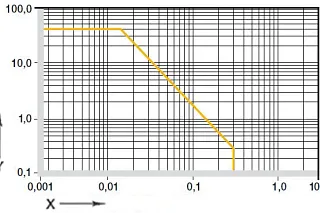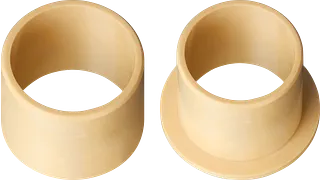Change Language :
iglidur® J260 - material data
The most important specifications at a glance
Similar to the classic, iglidur J, iglidur J260 is an endurance runner with outstanding wear behaviour, but provides increased reserves at its long-term application temperature of +120°C.
| Descriptive technical specifications | ||
|---|---|---|
| Wear resistance at +23°C | - 🟧 🟧 🟧 ⬜️ ⬜️ + | More information on wear resistance |
| Wear resistance at +90°C | - 🟧 🟧 🟧 ⬜️ ⬜️ + | |
| Wear resistance at +150°C | - 🟧 🟧 ⬜️ ⬜️ ⬜️ + | |
| Slide property | - 🟧 🟧 🟧 🟧 ⬜️ + | Coefficient of friction, dynamic, against steel: µ 0.06 - 0.20 |
| Wear resistance under water | - 🟧 🟧 ⬜️ ⬜️ ⬜️ + | |
| Media resistance | - 🟧 🟧 🟧 ⬜️ ⬜️ + | More information on media resistance |
| Resistant to edge pressures | - 🟧 🟧 🟧 ⬜️ ⬜️ + | |
| Resistant to shock and impact loads | - 🟧 🟧 🟧 ⬜️ ⬜️ + | |
| Dirt resistance | - 🟧 🟧 🟧 ⬜️ ⬜️ + |
Temperatures
The temperatures prevailing in the bearing system also have an influence on bearing wear. Wear increases with rising temperatures, and the effect is particularly noticeable from a temperature of +80°C upwards. Additional protection is required at temperatures higher than +80°C.
Temperatures, coefficient of thermal expansion
| min. application temperature | Upper application temperature, long-term | Upper application temperature, short-term | In addition secure axially from |
|---|---|---|---|
| -100°C | +120°C | +140°C | +80°C |
Permissible surface speeds
iglidur J260 has been developed for low to medium surface speeds. The maximum values specified in the table can only be achieved at low pressure loads. At the specified speeds, friction can lead to an increase up to the limit of the permanently permissible temperature. In practice, these limit values cannot always be achieved.
Surface speeds of various iglidur materials
| Maximum surface speeds [m/s] | Rotating | Oscillating | linear |
|---|---|---|---|
| Long-term | 1.0 | 0.7 | 3.0 |
| Short-term | 2.0 | 1.4 | 4.0 |
Permissible pv values

Diagram 01: Permissible pv value for iglidur J260 plain bearing with 1mm wall thickness in dry operation against a steel shaft, at +20°C, installed in a steel housing
X = surface speed [m/s]
Y = pressure [MPa]
Mechanical specifications
The maximum recommended surface pressure is a mechanical material parameter. Conclusions about the tribology cannot be drawn from this. The compressive strength of iglidur J260 plain bearing decreases with increasing temperatures. Diagram 02 illustrates this relationship. Diagram 03 shows the elastic deformation of iglidur J260 under radial load. Under the maximum recommended surface pressure of 40MPa, the deformation is less than 2.5%. Possible plastic deformation depends, among other things, on the duration of the impact.
Friction and wear
Like the wear resistance, the coefficient of friction μ also changes with the load. Interestingly, the coefficient of friction decreases with increasing load, while an increasing surface speed causes a slight increase in the coefficient of friction (diagrams 04 and 05).
Coefficients of friction against steel (Ra = 1μm, 50HRC):
| iglidur J260 | dry | Greases | Oil | Water |
|---|---|---|---|---|
| Coefficient of friction μ | 0.06 - 0.20 | 0.09 | 0.04 | 0.04 |
Shaft materials
Friction and wear are also highly dependent on the shaft material. Shafts that are too smooth increase both the coefficient of friction and the wear of the bearing. For iglidur J260, a ground surface with an average surface finish Ra = 0.8μm is best suited. Diagram 06 shows the results of the tests of various shaft materials with plain bearings from iglidur J260. In this context, it is important to note that the recommended hardness of the shaft increases with increasing load. The "soft" shafts are more prone to self-wear and thus increase the wear of the overall system when the load exceeds 2MPa. The comparison of rotation and pivoting in diagram 07 makes it very clear that iglidur J260 plain bearings show their strengths above all in rotational operation.
Chemical resistance
iglidur J260 plain bearings are resistant to diluted alkalis, hydrocarbons and alcohols. The very low moisture absorption also allows its use in wet or damp environments.
All data at room temperature [+20 °C], + resistant 0 conditionally resistant - non-resistant
| Chemicals | Resistance |
|---|---|
| Alcohols | + up to 0 |
| Greases, oils without additives | 0 to - |
| Hydrocarbons | + |
| Fuels | - |
| Strong alkalines | + up to 0 |
| Strong acids | - |
| Diluted alkalines | + up to 0 |
| Diluted acids | - |
Moisture absorption
Installation tolerances
iglidur J260 plain bearings are standard bearings for shafts with h-tolerance (recommended minimum h9). The bearings are designed for press-fit into a housing machined to a H7 tolerance. After installation in a housing with nominal dimensions, the inner diameter of the bearings with E10 tolerance adjusts automatically. For certain dimensions, the tolerance deviates from this depending on the wall thickness (see product range).
Important tolerances according to ISO 3547-1 after press-fit:
| Diameter d1 [mm] | Housing H7 [mm] | iglidur J260 plain bearing E10 [mm] | Shaft h9 [mm] |
|---|---|---|---|
| up to 3 | +0.000 +0.010 | +0.014 +0.054 | -0.025 +0.000 |
| > 3 up to 6 | +0.000 +0.012 | +0.020 +0.068 | -0.030 +0.000 |
| > 6 up to 10 | +0.000 +0.015 | +0.025 +0.083 | -0.036 +0.000 |
| > 10 up to 18 | +0.000 +0.018 | +0.032 +0.102 | -0.043 +0.000 |
| > 18 up to 30 | +0.000 +0.021 | +0.040 +0.124 | -0.052 +0.000 |
| > 30 up to 50 | +0.000 +0.025 | +0.050 +0.150 | -0.062 +0.000 |
| >50 to 80 | +0.000 +0.030 | +0.060 +0.180 | -0.074 +0.000 |
| >80 to 120 | +0.000 +0.035 | +0.072 +0.212 | -0.087 +0.000 |
| > 120 up to 180 | +0.000 +0.040 | +0.085 +0.245 | -0.100 +0.000 |

Buy iglidur J260 products in the online shop
- Large selection of moulds and materials
- Available within 24 hours
- No minimum order value
- No minimum order quantity
Typical application areas
- Automation
- Plant engineering
- Test engineering and quality assurance
- Robotics industry
- Electrical industry
Consulting
I look forward to answering your questions

Shipping and consultation
In person
Monday to Friday: 8 am – 8 pm
Saturday: 8 am – 12 pm
Chat-Service
Monday to Friday: 8 am – 5 pm
WhatsApp-Service
Monday to Friday: 8 am – 5 pm







